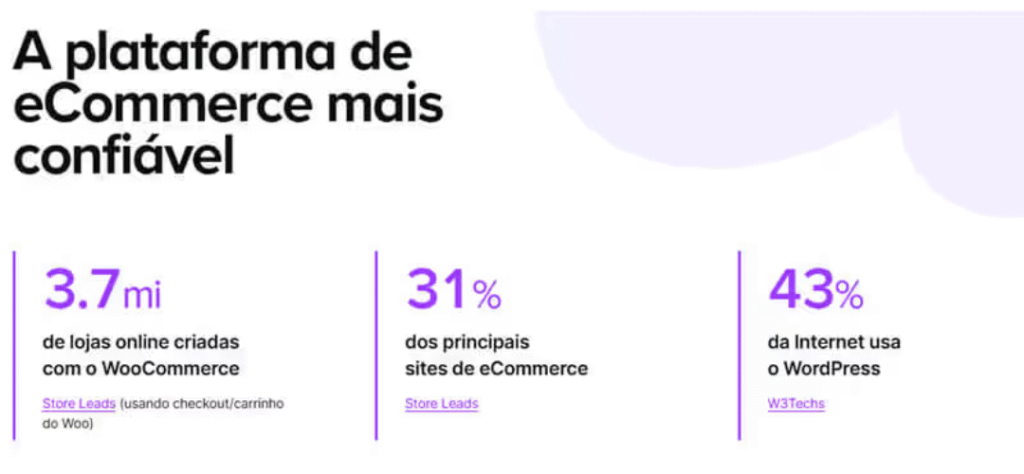The most widely used e-commerce platforms on the market stand out both for the number of active users and the amount of resources they offer their customers. Analyzing and understanding which of these tools lead the market can help you make a more informed decision.
In this article, we have compiled a list of the platforms with the highest number of active websites and stores around the world. Rather than focusing solely on features, the goal is to show which tools truly dominate the market and why so many companies rely on them to sell online.
Ranking of the most used e-commerce platforms in 2025
Now, check out the ranking of the main e-commerce platforms on the market:
1. WooCommerce
First on our list is WooCommerce, which has over 3.7 million active online stores worldwide. The platform stands out for offering complete product management, integration with various payment methods, and a wide variety of extensions and themes that make it easy to customize your store.

Today, brands such as Nutribullet, Dan-O’s Seasoning, and House of Malt trust and use WooCommerce to deliver a truly unique brand experience to their customers.
2. Wix
Next, let’s talk about Wix, a global website creation platform that powers more than 600,000 online stores worldwide. It has several interesting features, such as print-on-demand, product subscriptions, different revenue models, and dropshipping solutions.

In addition, Wix also offers over 900 free templates, built-in marketing and SEO features that help drive traffic and increase your sales. All of this makes it one of the most widely used e-commerce platforms in the world.
3. Tray
Tray is a well-established Brazilian platform that hosts thousands of online stores in the country and offers a complete solution for those who want to start selling online. Among its main features, you will find automatic invoice issuance, in-store chat, email marketing, various payment systems, and much more.

Brands such as Fabrispuma have achieved excellent results with Tray, achieving a 478% increase in GMV and 112% in organic traffic. The platform also has more than 2,000 integrations, 30 marketplaces, and 1,000 connected ERPs, in addition to more than 550 ready-made layouts.
4. Nuvemshop
It is also worth mentioning Nuvemshop, one of the most widely used e-commerce platforms in Latin America, with over 170,000 active retailers and R$17 billion in annual sales. Nuvemshop customers have access to integrated sales, inventory, and marketing management in one place.

In addition, they offer integrated payment solutions, an intelligent anti-fraud system, transparent checkout, and more than 60 customizable layouts to give the store the brand’s look and feel.
5. Shopify
With around 2.6 million active online stores globally, Shopify is one of the most widely used e-commerce platforms in the world. They offer a complete structure, with features such as an integrated payment system, secure checkout, and customizable templates.

Brands such as Sallve, Glambox, Biossance, and Kings Sneakers use Shopify to operate their online stores because they have access to integrated marketing campaigns, omnichannel support, and scalability options.
6. SITE123
We couldn’t leave SITE123 off our list of most popular e-commerce platforms. After all, it hosts over 69,000 online stores and is known for its super intuitive interface, which is perfect for users without technical knowledge.

Among the main features available, the following stand out: inventory management, the ability to configure the store to accept different currencies, a discount coupon system, and secure checkout with SSL.
7. Integrated Store
Next, we have Loja Integrada, a platform with over 2.5 million stores created, which allows you to set up a complete online store in just a few steps. It offers free and paid plans, with features that evolve as your business grows.

The platform stands out for its accessible ecosystem, intuitive use, award-winning support, and readiness for high-traffic moments, such as Black Friday. In addition, it can be integrated with tools such as Google PMax, Dropi (for dropshipping), and many others.
8. GoDaddy
GoDaddy has more than 150,000 active stores on its platform, offering a simple and complete solution for those who want to quickly create an online store. Among its unique features are the ease of creating ads on social networks, integration with email marketing tools, flexible shipping options, and scheduling services directly through the store.

9. WordPress Ecommerce
WordPress is the most widely used CMS platform in the world, accounting for around 43.5% of all websites on the internet. Of this total, approximately 20.5% of WordPress sites use WooCommerce as their e-commerce solution.

Among the features that make WordPress + WooCommerce so popular are complete customization flexibility (because it is open-source), comprehensive product management, integration with multiple payment methods, and a rich ecosystem with thousands of plugins and themes.
10. Shoplazza
To conclude our list of the most widely used e-commerce platforms, we have Shoplazza, which currently has over 500,000 active stores in more than 180 countries. The company offers over 200 apps in its app store, as well as open APIs, developer resources, and a strong partner ecosystem.

Have you discovered which e-commerce platforms will be most widely used in 2025?
We hope this guide has helped you understand which platforms are most widely used in the market and how each one can serve companies of different sizes and segments.
If you are already researching platforms, you are probably also evaluating which products to sell. To help with this planning, we have created a list of products for resale that may be in high demand on these platforms.

